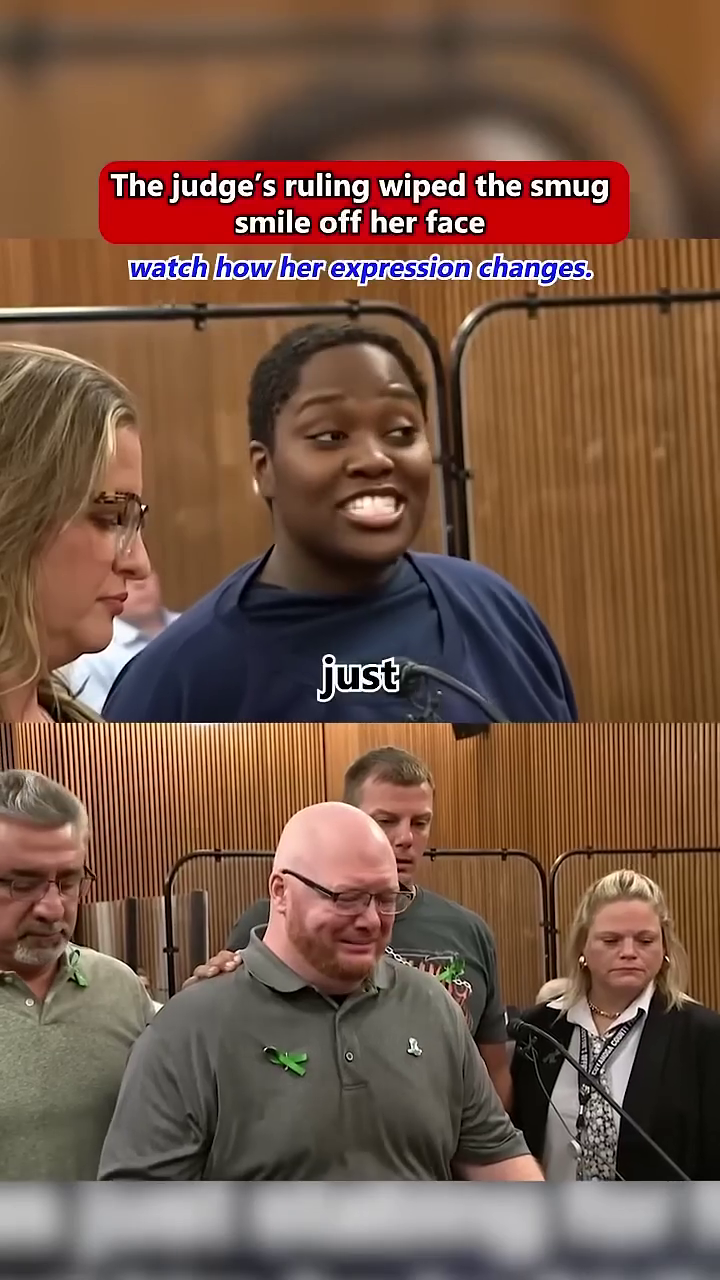On a quiet afternoon in a suburban Ohio grocery store parking lot, an act of seemingly random and unimaginable violence forever altered the lives of an entire family and horrified a nation. The event involved the senseless klling of three-year-old Julian Wood and the serious injury of his mother, Margot Wood. The central figure in this tragedy, Bionca Ellis, quickly became the focus of intense scrutiny—not just for the brutal nature of the crime, but for her startling, at times disturbing, behavior during court proceedings.
This is the story of the crime, the controversial legal battle over sanity, the heart-wrenching testimony of a grieving family, and the moment a judge’s ruling delivered the maximum sentence, dramatically shifting the demeanor of the convicted woman.
The Attack: A Day That Shattered a Family
The incident took place in June 2024, outside a Giant Eagle supermarket in North Olmsted, Ohio. Surveillance footage and eyewitness accounts detailed a swift, brutal, and seemingly unprovoked attack. Bionca Ellis, 34, had reportedly stolen two knives from a nearby thrift store, entered the supermarket, and then specifically targeted Julian and his mother as they were leaving the premises.
Julian Wood was sitting in the shopping cart when Ellis approached the family’s vehicle and, in a matter of seconds, used the stolen weapon to stab the toddler multiple times. Margot Wood, Julian’s mother, bravely tried to shield her child, resulting in her own serious injuries. Julian was rushed to a nearby hospital but tragically could not be saved. His mother was treated for her wounds, but the emotional scars of that day would be permanent.
Ellis was apprehended shortly after the attack, found walking away from the scene with a knife in hand. The motive for the crime remains unclear, with authorities stating the attack appeared to be entirely random. The complete lack of a connection between the attacker and the victims only added to the community’s shock and grief.
The Courtroom Confrontation: Behavior That Shocked the Public
From the moment Bionca Ellis first appeared in court, her conduct drew widespread attention and condemnation. During several preliminary hearings, Ellis exhibited erratic and bizarre behavior. She sometimes stared blankly, refused to answer the judge’s questions, and, most controversially, was captured on camera smiling and giggling during her arraignment.
This perceived lack of remorse, or outright amusement, in the face of such a horrific accusation, fueled public outrage. Videos circulated online, focusing on the stark contrast between her unsettling smiles and the profound grief of Julian’s father, Jared Wood, and his extended family who were present at every hearing.
The Plea of Not Guilty by Reason of Insanity
The legal path for Ellis became complicated when her defense attorneys entered a plea of Not Guilty by Reason of Insanity (NGRI). The defense argued that Ellis was struggling with a severe mental disease—specifically a diagnosis of schizophrenia—and that she was unable to understand the wrongfulness of her actions at the time of the attack.
This argument was a critical turning point in the trial. Ellis had been deemed incompetent to stand trial initially but was later ruled competent after months of court-ordered psychiatric treatment, which included anti-psychotic medication. The trial was therefore not about whether she committed the physical act—which her lawyers conceded—but whether she possessed the necessary mental capacity to be held criminally responsible under the law.
The prosecution fiercely countered the NGRI plea, arguing that Ellis’s actions were calculated. They presented evidence, including surveillance footage showing her selecting and stealing the weapons, stalking the mother and child in the store, and executing the attack with swift, focused intent. The prosecution maintained that even with a mental health history, her actions demonstrated a clear awareness of her terrible conduct.
The jury ultimately rejected the insanity defense, finding Bionca Ellis guilty on all counts, including:
- Aggravated Murd3r
- Murdr (Two counts)
- Attempted Murd3r
- Felonious Assault
- Endangering Children
- Theft
The Victim Impact Statements: A Family’s Final Plea
The sentencing hearing, presided over by Judge John J. Russo, was arguably the most emotional day of the entire legal process. Before the judge delivered the sentence, Julian Wood’s parents delivered deeply personal and gut-wrenching victim impact statements.
Jared Wood, Julian’s father, spoke directly about the void left by his son and directed his anguish toward Ellis, calling her a “monster” and asking the court to ensure she remained behind bars for the rest of her life. He struggled to maintain his composure while speaking about the profound and irreplaceable loss.
Margot Wood, the mother who was injured while trying to save her son, offered equally powerful testimony. She spoke about the terrifying final moments of Julian’s life, which constantly replay in her mind. She emphasized that no mental illness could justify the monstrousness of the crime, a clear rejection of the defense’s plea. Her words were a plea not for vengeance, but for eternal security against this terrible person ever harming another child.
These statements were more than just testimony; they were the collective voice of a family demanding true justice for a life brutally taken too soon.
The Verdict and the Moment the Smile Vanished
The emotional climax came when Judge John J. Russo, having heard the evidence and the family’s pleas, delivered the maximum sentence allowed under Ohio law.
Addressing Bionca Ellis, Judge Russo acknowledged the difficulties and gaps in the mental health system that the defense had raised. However, he stressed that these factors did not negate the severity of her actions or the need for justice. The judge stated that the horrific, deliberate nature of the crime—targeting an innocent child in a shopping cart—warranted the strongest possible punishment.
Judge Russo sentenced Bionca Ellis to life in prison without the possibility of parole.
The video that captured this moment became viral because it showed a visible and immediate transformation in Bionca Ellis’s demeanor. The unsettling confidence, the smirk, and the smiles that had defined her courtroom appearances instantly evaporated. When the words “life in prison without the possibility of parole” were spoken, the realization of her ultimate fate seemed to land with full, crushing weight. Her face, which had been passive or smiling, reportedly turned to shock or fear, the casual demeanor gone in a flash.
For Julian Wood’s family, the sentence represented a final measure of justice. It meant the person who kllled their three-year-old son would never walk free, giving them a form of closure and security that no amount of time could replace.
The Legacy of Julian Wood
The case of Bionca Ellis and Julian Wood serves as a tragic reminder of random violence and the complexities of the justice system in dealing with defendants who have a history of mental health challenges. While the case sparked necessary conversations about mental healthcare access and treatment, for the Wood family, the focus remains on the life of their son.
Julian Wood is remembered as a vibrant, loving child whose future was cruelly taken away. The enduring legacy of this trial is not just the sentence handed down, but the profound strength and advocacy shown by his parents in their tireless fight to ensure that the monster who kllled their son would never be able to commit such a horrible act again. The judge’s ruling ensured that the fight for justice for Julian was honored.

